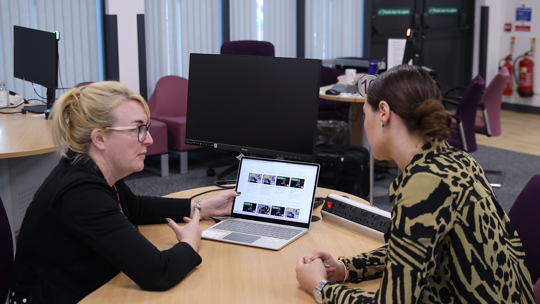
Salford Council's Digital Help Finder - Connecting Residents to Digital Services
In 2023, Salford Council conducted a survey of 200 residents to better understand their digital needs. The survey revealed that while 88% wanted to acquire digital skills, 51% didn't know where to start. To address this, Salford Council introduced the Digital Help Finder tool in March 2024, making digital resources and support easily accessible to residents.
Whether you're taking your first steps online, seeking support on a specific topic, needing access to a device or data connectivity, or looking to enhance your existing digital skills, the Digital Help Finder tool connects you to all available resources in your area.
How does it work?
Just visit salford.digitaltriage.hoopd.co.uk and the tool will:
- Assess your needs: Answer a few simple questions, and the tool understands your unique digital inclusion requirements
- Tailor recommendations: Based on your responses, it provides personalised recommendations for Salford based resources, training, and assistance - all at your fingertips
- Free and accessible: The tool is completely free, ensuring that everyone can use and benefit from it.
Who can use it?
- Salford residents: Anyone can use the tool directly – for personal use or if you’re helping someone. It’s user-friendly and accessible to everyone
- Front-line service staff: If you work in libraries, gateways, or community hubs, this tool empowers you to connect residents with the right digital support
- Community and voluntary sector: We’ve designed this tool for the broader community. Community organisations, volunteers, and advocates can use it to support our residents and nurture digital literacy across Salford.
Benefits to council services:
- Reduced front-line pressure: The Digital Help Finder lightens the load on front-line services. With 15% of Salford’s population lacking essential digital skills, it eases the strain on service providers
- Time savings: The tool saves over 26 hours per week across our face-to-face services, allowing staff to focus on critical tasks
- Cost savings: The resulting cost savings amount to over £19,000 per locality
- Staff well-being: Staff stress levels have decreased by 40%, contributing to a healthier work environment.
Elizabeth Perrin a Customer Service Officer at Eccles Gateway found it very promising, stating, "Very positive...this seems like it will save lots of time and also be a more accurate way of finding the right solution for the customer."

Developed by Mortar: An LGA backed solution
The Digital Inclusion Triage Tool has been designed and developed by Mortar as an Local Government Association (LGA) backed solution to offer local authorities, their partners and front-line services a dynamic platform to design and implement triage pathways and more effective methods of directory navigation and management. With their expertise, Salford have created a powerful tool that brings together all the resources of 80+ organisations in one place, opening up a new world of digital inclusion to our residents and front-line staff.
Impacts of digital inclusion
In 2022, Good Things Foundation with Capita commissioned Cebr to update their report on ‘The Economic Impact of Digital Inclusion in the UK’
This research calculated that:
- 16% of UK adults (around 8.5 million people) lack basic digital skills. Around 18% of the UK labour force lacks the essential digital skills needed for work
- For every £1 invested in interventions to enable digitally excluded people to build their basic digital skills, a return of £9.48 is gained throughout the economy, with a returned net present value of £12.2 billion
- Savings to the public purse are strong, with estimated benefits to the government of £1.4 billion through efficiency savings alone, plus £483 million in increased tax revenue with the NHS expected to save £899 million in addition
- Citizens of all ages also benefit through time saved from using online government and banking services (valued at £3.9 billion) and money saved through online shopping (£3.5 billion)
- Without further intervention, 5.8 million people are estimated to remain digitally excluded by the end of 2032.
Continued assessment and enrichment:
As we monitor the tool’s impact, we remain committed to reaching excluded residents and enhancing digital skills.
- Reaching Excluded Residents: Ensuring the tool effectively reaches those who need it most
- Improving Digital Skills: Continuously enhancing residents’ digital capabilities
- Leveraging Data: Assessing the value of the tool’s dataset
- Enhancing DERI: Exploring ways to complement Salford’s Digital Exclusion Risk Index (DERI) for targeted interventions
- Advocating for Investment: Making stronger business cases for local area investment in digital devices, connectivity, and digital skills.
Join us in bridging the digital divide and ensuring that no one gets left behind. Let’s make Salford a place where everyone can thrive in the digital age!

About the author
Digital Everyone
The Digital Everyone project is part of Salford’s aim to become a Digital City, an ambition which forms part of our wider vision for a better, fairer Salford to improve resident’s lives.